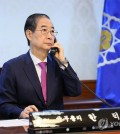- California Assembly OKs highest minimum wage in nation
- S. Korea unveils first graphic cigarette warnings
- US joins with South Korea, Japan in bid to deter North Korea
- LPGA golfer Chun In-gee finally back in action
- S. Korea won’t be top seed in final World Cup qualification round
- US men’s soccer misses 2nd straight Olympics
- US back on track in qualifying with 4-0 win over Guatemala
- High-intensity workout injuries spawn cottage industry
- CDC expands range of Zika mosquitoes into parts of Northeast
- Who knew? ‘The Walking Dead’ is helping families connect
Han Kang’s Nobel win marks global recognition of S. Korea’s collective trauma, literary healing
Han Kang’s unexpected Nobel Prize win in literature this year transcends a national milestone. For many Koreans, it signifies not only the chance to read a Nobel laureate’s work in their native language, but also the recognition of the country’s collective historical wounds and a shared literary journey toward healing.
In announcing their decision, the Nobel committee cited “her intense poetic prose that confronts historical traumas and exposes the fragility of human life” as the motivation for the award.
“She has a unique awareness of the connections between body and soul, the living and the dead, and in her poetic and experimental style has become an innovator in contemporary prose,” they said.
Since her literary debut as a poet in 1993, Han Kang has long held an unrivaled position in Korean literature. Even before gaining global recognition with “The Vegetarian,” which won her the Man Booker International Prize in 2016, she was celebrated for creating a distinctive literary world that explores universal human issues, such as death and violence, through a poetic and lyrical style.
In her Nobel Prize lecture at the Swedish Academy in Stockholm on Dec. 7, she described her literary journey as a pursuit of the pressing questions that shaped her existence — questions so “urgent” that she sacrificed aspects of her personal life to seek answers through her writing.
“Where is love?” and “What is love?” were the questions that sparked her initial literary journey. These were later followed by another set of profound inquiries that culminated in “The Vegetarian”: “Can a person ever be completely innocent?” “To what depths can we reject violence?” “What happens to one who refuses to belong to the species called human?”
When she began writing the “radiant, life-affirming” novel, “Human Acts,” in 2012 about the mass civilian killings during the Gwangju Uprising under the military dictatorship of Chun Doo-hwan in May 1980, she grappled with fundamental and painful questions; “Is this the act of one human towards another?” “How are humans this violent?” “And yet how is it that they can simultaneously stand opposite such overwhelming violence?”
She admitted that she “had long lost a sense of deep-rooted trust in humans.” But she then realized she “had to face this impossible conundrum if I meant to move forwards,” and that “writing was my only means of getting through and past it.”
For “Human Acts” — and later for her novel “We Do Not Part” about the Jeju April 3 incident — Han “read about mass killings that humans have repeatedly perpetrated throughout the world and throughout history.” This research led her to confront profound questions: “To what extent can we love? Where is our limit? To what degree must we love in order to remain human to the end?”
Her Nobel recognition showed how the author’s painful inquiries over the three decades have resonated deeply within South Korea and beyond, all the while maintaining faith in humanity and connecting people through “golden threads.”
In her native country, the announcement of her win in October triggered a sudden surge in demand for her works. Local bookstores quickly sold out, the websites of some major bookstores were briefly paralyzed and readers had to wait for new prints to become available. Her works continue to dominate the best seller lists in the country’s major bookstores.
Ironically, the domestic political turmoil following President Yoon Suk Yeol’s short-lived imposition of martial law earlier this month sparked a renewed demand for her books, especially “Human Acts,” which exposed the horrors of extreme state violence in the aftermath of a similar declaration in 1980.
This political upheaval underscored the ongoing relevance of her works in present-day Korea, and by extension, in other countries experiencing state violence and war.
In the Nobel Prize banquet speech on Dec. 10, the author expressed the significance and role of literature in a world where “suffering and love” co-exist.
“The work of reading and writing literature stands in opposition to all acts that destroy life,” she said. “I would like to share the meaning of this award, which is for literature, with you — standing here in opposition to violence together.”











